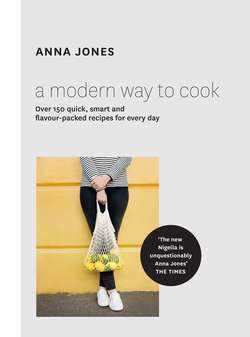Читать книгу A Modern Way to Cook: Over 150 quick, smart and flavour-packed recipes for every day - Anna Jones, Jamie Oliver - Страница 8
Eating well
ОглавлениеI am passionate about eating food that makes me feel good, and while I’ll sometimes reach for a trashy chocolate bar or a stodgy pub roast (which is all part of being human and nothing to be ashamed of), I know that’s not the food that I feel good eating.
I want stand-out, delicious food that leaves me feeling energised, light, bright and satisfied. It’s this intersection between wellness and deliciousness that I strive for with every plate of food I make and eat. And with all the talk of health and wellness in the food industry, I think this sweet spot is becoming ever more important. Wellness doesn’t come at the expense of deliciousness.
I welcome with open arms the new breadth of information and attention around eating well, and I am so thrilled that we are all putting more focus on what we put into our bodies and on the connection between the food we eat and how vibrantly we live.
But I also think it’s important to remember that we are all individuals, each with our own completely separate nutritional needs. I can tell you what works for my body, but I honestly can’t tell you exactly what’s going to work for yours. Nor in my opinion can any chef or, really, any nutritionist. While nutritionists can absolutely be a guide, it is you who have to do the work. You need to have a relationship with your body and a responsibility to listen to it and how it reacts to certain foods. If you feel tired and bloated after eating something, make a change next time – eat a smaller portion, or try a different way of cooking, or another ingredient.
There are lots of people out there ready to name superfoods that can help us lose weight, cure illness and make us more attractive and amazing. It sometimes feels to me as though all this sometimes over-the-top focus on nutrition and ‘clean eating’ has almost become the new, more acceptable way to be on a diet. And in a weird way, that isn’t promoting a healthy attitude to food at all.
It’s important to make a commitment to eating well, but it’s also important to be realistic. Cooking goodness-packed meals every night is going to have a huge impact on your health, and simply getting more vegetables into your diet is a great first step. You can worry about matcha and chia seeds later on.
To me, eating well is far more simple than it is often made out to be. Buy good ingredients, cook at home, make the majority of what you eat plants and vegetables, and listen and react to your body. I don’t think it’s much more complicated than that. Right now, too many sweeping generalisations are being made in the world of food. Foods like bread are being vilified, and chefs and nutritionists are making blanket statements about how certain staple, cheap and useful nutritious foods are unduly bad for our bodies. I think this is damaging, as it means our psychology around these foods changes. We attach guilt and a ‘forbidden’ label to food, increasing our anxiety around it and causing us to crave it even more.
My point here is this: let’s stop looking at food in its respective parts, and making some bad and some disproportionately good. Let’s get back to the whole picture, the whole food. Choosing a balanced way of eating and sticking as close to nature as we possibly can is the most realistic plan for eating long-term. Going to extremes is not a sustainable way of eating or living. What I am proposing here and with the recipes in this book is a sensible, flexible dietary strategy that we can incorporate into our lives successfully and joyfully, day-to-day, and over a lifetime.
